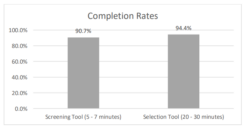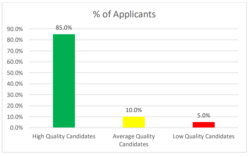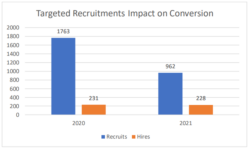Companies are becoming increasingly concerned (some even obsessed) with the impact of assessments on candidate experience and engagement. This surge in interest is likely an artifact of the current talent landscape, where companies are struggling to attract and engage quality candidates. Whatever the root cause, the reality is that candidates who are unwilling to complete an assessment are often poor quality candidates who are simply looking for any job and do not have the interest level or motivational level to invest in their career planning. As a result, candidates who drop out are actually screening themselves out of the process and saving an organization time and resources to process poor quality candidates. Recruiters can focus on a greater proportion of QUALITY applicants which will positively impact both top and bottom lines.
Assessments Often Reflect Candidate Engagement and Commitment
In a recent large scale study (300,000+ applicants) conducted by Self Management Group, it was found that 92% of all applicants who started a selection assessment, subsequently completed the assessment and moved into the next phase of the recruitment process. What was even more intriguing, is that the completion rates did not differ between assessment tools of varying lengths. These findings suggest that assessment tools drive applicant engagement and introduce a degree of commitment into the recruitment process.

 An even more critical finding was that 85% of these engaged candidates were found to be “high quality” according to the predictive selection criteria comprising the assessment. Consequently, not only are assessment tools helping to engage candidates within the recruitment process, they are, in fact, engaging the right types of candidates.
An even more critical finding was that 85% of these engaged candidates were found to be “high quality” according to the predictive selection criteria comprising the assessment. Consequently, not only are assessment tools helping to engage candidates within the recruitment process, they are, in fact, engaging the right types of candidates.
Why Assessments Engage Quality Candidates
These findings align with many of the trends that Self Management Group has previously published. For example, we have found that high quality candidates are almost universally achievement-oriented and competitive. As a result, they are turned off by career opportunities that are open to everyone. These individuals demand exclusivity and want to compete for opportunities where only the best are sought after. This is why selection assessments engage quality candidates. In contrast, assessments have the exact opposite effect on low quality candidates. These individuals do not want any barriers to entry and are unwilling to invest even the most minimal amount of time towards an application process. This leads to the obvious question, “if a candidate isn’t willing to invest 10 – 20 minutes in the pursuit of a career opportunity, are they likely to be the type of employee that you actually want”? The answer is rhetorical.
Assessments Increase Recruiter Efficiency
Another extremely important finding regarding assessment tools is that they allow recruiters to maximize their time and resources by focusing on candidates that have a higher probability for success. Assessments take the subjectivity and guess-work out of identifying quality candidates, by providing an objective and validated measure that can be used to evaluate the candidates in the recruitment pipeline. The graph below illustrates the impact a more targeted recruitment process (one that uses assessments to identify quality candidates) can have on conversion ratios:

In 2020, this company had to talk to 1763 individuals in order to make 231 quality hires, which corresponds to a 13.1% conversion ratio. However, in 2021 when they adopted a more targeted recruitment strategy leveraging SMG’s assessment recommendations, they only had to talk to 962 candidates to generate 228 quality hires (a conversion ratio of 23.7%). Nearly half the recruitment conversations to generate the exact same amount of quality hires. The use of assessment tools evolves the recruitment process from administrative to strategic, and provides a valuable resource to help identify and convert high quality candidates.
Conclusion
Assessment tools are a central component of any “best practices” recruitment process. They deter and knock out low quality disengaged candidates early in the process, while engaging and motivating achievement-oriented high quality candidates. As the graphs above illustrate, almost everyone who starts an assessment finishes it, demonstrating unequivocally that they possess an engagement quality and do not facilitate candidate drop off. Moreover, assessments allow recruiters to be much more effective and efficient by focusing their limited resources on the conversion of high quality candidates. In todays current talent landscape, assessment tools provide a major strategic advantage.

